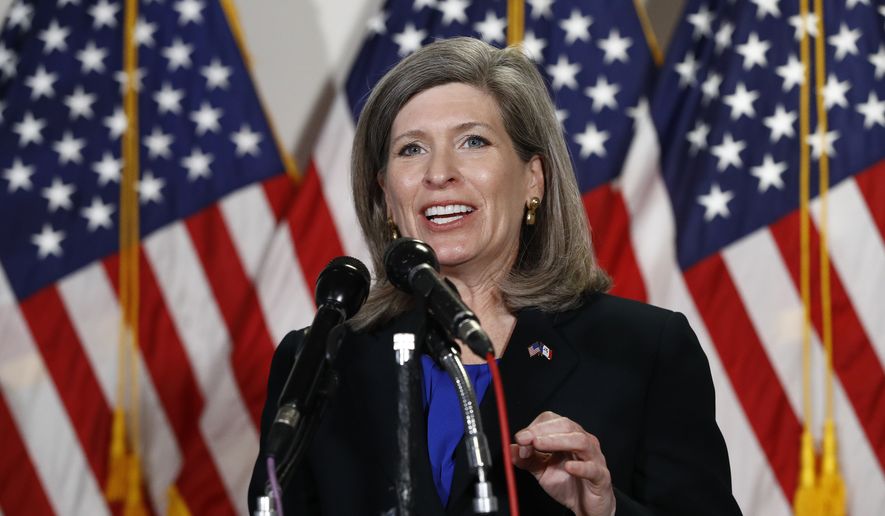The federal government is poised to pay out tens of millions of dollars in unemployment benefits to millionaires who find themselves out of work during coronavirus and are still can collect $600 a week under the stimulus bill despite their wealth.
Exact numbers won’t be known for a few years, but based on the last recession it’s likely that thousands of people who will earn at least $1 million this year but find themselves between work will hold out their hand asking Uncle Sam for an unemployment check.
Sen. Joni Ernst, Iowa Republican, said Wednesday she wants to have Congress cut them off, calling it an affront to struggling workers who really need the benefits.
“We may be spending $2 million a week or more paying millionaires not to work,” she told reporters. “We cannot afford to be subsidizing the lifestyle of coastal elite millionaires.”
She’s proposing a self-certification test, which would require unemployment-benefit applicants to report whether their income will top $1 million this year. If so, they’ll still be able to collect unemployment from their states but won’t be eligible for the $600-a-week federal enhancement that Congress approved in March.
The idea has been tested before.
Back during the Great Recession, then-Sen. Tom Coburn, Oklahoma Republican, offered a similar plan to prevent millionaires from obtaining enhanced unemployment. It passed the Senate on a 100-0 vote, though it never cleared the House to become law.
Voting for that 2011 plan were Sen. Charles E. Schumer of New York, now the Democrats’ leader, and Sen. Ron Wyden of Oregon, the top Democrat on the Senate Finance Committee.
Asked whether they would back Ms. Ernst’s proposal this year, their offices clammed up.
But the idea did intrigue some of those in the Democrats’ base — including Morris Pearl, chair of Patriotic Millionaires, a group of wealthy people who argue the government is letting the wealthy off too easy and should raise taxes.
Mr. Pearl told The Washington Times in a statement that the people he knows making $1 million a year “seem to be doing just fine” during coronavirus.
“We know that low-income workers are much more likely to have lost their jobs than rich people, and that’s the group that we should be focused on assisting,” he said. “If someone lost their job but is still making over $1 million this year, they’re still going to be fine. They don’t need an extra $600 a week.”
Ms. Ernst won election six years ago with a campaign ad pointing out she’d once castrated pigs on her family’s farm and would bring that same approach to Washington’s big spenders to “make ’em squeal.” Every month she gives her “squeal” award to another silly spending idea, and she said the unemployment benefits for millionaires is her “winner” for the month of May.
The generous unemployment benefit was part of Washington’s “flatten the curve” approach to the virus. The goal was to entice workers out of the workplace during the virus’s peak spread, limiting the chances that patients would overwhelm the health system.
The $600-a-week federal plus-up is on top of whatever states already do. The average state benefit is $378, so with the federal add-on, Americans can collect nearly $1,000 a week sitting home.
It’s worked — perhaps too well.
As businesses eye reopening, they’re finding that their employees don’t want to come back. Many are earning more sitting on the couch than they did at their old jobs.
Under current law, the federal plus-up stops at the end of July. President Trump this week signaled he would stick by that expiration, while Democrats are already advancing legislation to extend it into next year.
Ms. Ernst said everyone pays into the basic unemployment insurance system run by the states through their jobs, so all workers should be entitled to that.
But she said the $600 federal add-on is coming from out of general federal funds, which are already strained to record levels. That means the government is taking on more debt to pay for the benefits.
Ms. Ernst’s bill would require those who apply for the enhanced federal benefits to certify that their incomes this year will not top $1 million.
She said she chose that level because it’s the sort of thing that resonates with average Americans, and that should draw support from Democrats.
The IRS’s reporting lags a few years behind, so it’s not clear just how many people with million-dollar incomes are collecting unemployment.
Often they will show earnings from investments, which is why they can be without a job but still show such massive income. Another option is they could be a couple filing jointly, where one person had earnings and the other was jobless.
In 2017, the latest data available, 2,509 tax returns with income of at least $1 million also showed unemployment benefits. Nineteen of those had incomes of $10 million of more. They collected about $20 million in benefits.
Expanding the numbers to those making $500,000 a year or more showed another 12,277 tax filers getting unemployment, totaling more than $80 million in payments.
In 2010, during the Great Recession, at one point more than 3,000 people with million-dollar incomes were collecting unemployment. And when expanded to incomes of $500,000 or more, about 10,600 more filers were shown getting payments.
States themselves are banned from trying to impose income restrictions, under a 1964 decision by the Labor Department.
• Stephen Dinan can be reached at sdinan@washingtontimes.com.




Please read our comment policy before commenting.